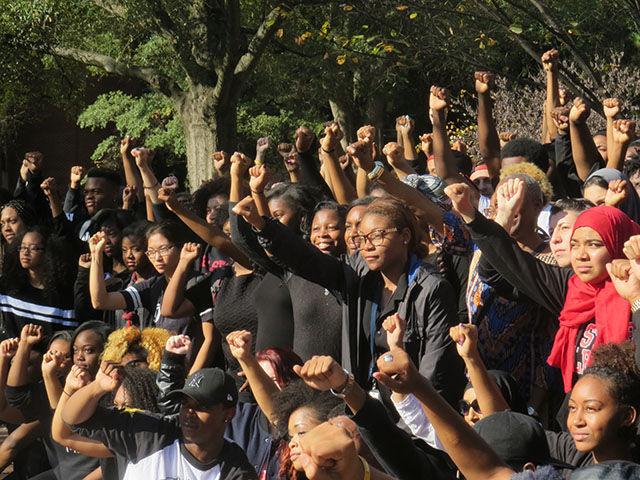In the days leading up to Thanksgiving break, the Student Senate passed the Missouri Solidarity Act after much debate among senators, concerned students who were in attendance and Student Body President Khari Cyrus over an amendment to the bill that characterized protesters in an unfavorable light. The amendment to the bill ultimately failed.
The bill is meant to serve as a statement of solidarity with the students of the University of Missouri and specifically names several other institutions including Ithaca College, Claremont McKenna College, Smith College and Yale University, all of which have held demonstrations against the lack of attention given by administrators to institutionalized racism on their campuses.
Senator John Willis, a freshman studying business and a co-sponsor on the bill, said in an email, “In our opinion, the issue at the heart of it all is that indifference regarding issues of racism and diversity is not OK. Officials within college communities (or any community for that matter) should be held accountable for their responsibility to act in response to racial incidents.”
Many NC State students not affiliated with Student Government attended the meeting to share their personal trials with institutionalized racism and the student body’s need to reach out to those in Missouri and nationwide who are fighting this problem.
Several aspects of the bill were heavily debated, one being a proposed amendment to the bill. This amendment included a clause stating that NC State supports “peaceful” and “nonviolent” actions against institutionalized racism.
Cyrus expressed his concern for these semantic differences.
“We really shouldn’t have to qualify our stance on this bill,” Cyrus said. “If this amendment is in there it is going to be hard for me to give them that call or statement of support — we either need to stand in solidarity or not at all.”
Much of the thinking by those against the amendment was that the use of “peaceful” and “nonviolent actions” in the bill was offensive, because it implies that Missouri’s protests thus far had been violent. Student Senator Luke Perrin, a freshman studying political science and a co-sponsor of the bill, said the protests at the University of Missouri had been peaceful.
Most threats came from outside the communities in question. There were several reports of death threats directed at protesters at the height of the tension, though police never established any imminent danger to the campus, according to CNN and the Columbia Missourian.
Senator Jesse Grady, a freshman studying agribusiness management, also addressed the amendment, saying that the terms “peaceful” and “nonviolent” were the terms used by Martin Luther King and other activists of the civil rights movement. He felt this clause was necessary and that the amendment should be added to the bill.
Senator Kelly Elder, a senior studying political science and a secondary sponsor of the bill, said that including the “peaceful” and “nonviolent” qualifiers in the bill was equivalent to “talking down to [the protesters] when we are same age.”
“They have more institutionalized racism at their schools than we do,” Elder said. “I really think that we shouldn’t be offended by what they are doing. They are trying to create an equalized institution.”
The amendment did fail after much debate. The majority of those who voted against it thought it would send the wrong message, and if NC State was going to make a statement, it needed make a strong one.
Debate continued after the amendment failed. Several students discussed their views of institutionalized racism on campus and a majority who spoke felt that it is a problem on NC State’s campus, as well as others.
Chancellor Randy Woodson echoed this sentiment in his Chancellor’s Letter Nov. 12, saying, “Recent events around the country and within the NC State community have served to remind us all that we have not progressed as much as we would all hope in our journey toward cultural competency.”
In his letter, Woodson said the Council on Undergraduate Education is reviewing the diversity component of the General Education Program. He said he has asked Provost Warrick Arden and Vice Chancellor Mike Mullen to “insure that the student voice is part of this discussion as the committee and the faculty consider the best approach to insuring diversity and inclusion are a meaningful part of our curricula at NC State.”
P.J. Adams, a psychologist and the multicultural coordinator at the Counseling Center who attended a rally in support for the cause against institutional racism along with several other faculty members, said that in order to make lasting change, administrators have to be proactive in addressing racial disparities on campus.
“Institutionally, to me, it’s about stepping beyond our policies,” Adams said. “A lot of systems or universities will have something on paper whether that’s like a ‘diversity statement’ — but how do we live those values?”
Barbara Kirby, associate vice provost of Academic Programs and Services, said in an email that the Council on Undergraduate Education is “evaluating the diversity component of the General Education Program” and that “the subcommittee is still working on its report.” She added that the discussions will likely last through the end of the semester.








